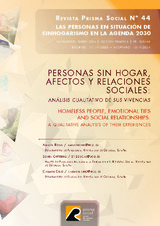Mostrar el registro sencillo del ítem
Personas sin hogar, afectos y relaciones sociales: análisis cualitativo de sus vivencias
| dc.contributor.author | Reina Giménez, Amalia | |
| dc.contributor.author | Gutierro, Sonia | |
| dc.contributor.author | Cruz, Carmen | |
| dc.date.accessioned | 2024-02-08T07:51:09Z | |
| dc.date.available | 2024-02-08T07:51:09Z | |
| dc.date.issued | 2024 | |
| dc.identifier.issn | 1989-3469 | |
| dc.identifier.uri | http://hdl.handle.net/10396/27270 | |
| dc.description.abstract | El fenómeno del sinhogarismo trasciende la carencia de una vivienda propia y conlleva, entre otras cuestiones, la ruptura de vínculos afectivos. Esto plantea la necesidad de comprender cómo las personas afectadas por esta situación logran establecer nuevas relaciones y reconstruir nuevos vínculos con otras personas en situaciones similares o diferentes. La finalidad de este trabajo ha sido explorar las vivencias en situaciones de sinhogarismo en torno a las relaciones sociales y vínculos afectivos que se establecen con otras personas en situaciones similares o diferentes y los obstáculos que encuentran para ello. La investigación se enmarca en una metodología cualitativa de corte inductivo y emergente, basada en la Teoría Fundamentada. Se llevaron a cabo ocho entrevistas individuales semiestructuradas y 26 sesiones-talleres con la participación de ocho personas alojadas en diversas Casas de Acogida en la ciudad de Córdoba. El análisis temático del contenido del discurso, apoyado por el software Nvivo, revela la existencia de diferentes obstáculos en el establecimiento de relaciones interpersonales, que abarcan desde el miedo al fracaso hasta inseguridades por experiencias previas en situación de calle. Además, destacan factores contextuales, como la brevedad de las estancias en los lugares de acogida, que dificultan la construcción de redes de apoyo estables. | es_ES |
| dc.description.abstract | The phenomenon of homelessness goes beyond the lack of personal housing, as it involves, among other issues, the breaking of emotional ties. This raises the need to understand how individuals affected by this situation manage to establish new relationships and rebuild connections with others in similar or different circumstances. The purpose of this study has been to explore the experiences in homelessness situations regarding the social relationships and emotional ties established with others in similar or different situations, as well as the obstacles they encounter in doing so. The research is framed within an inductive and emergent qualitative methodology based on Grounded Theory. Eight individual semistructured interviews and 26 workshop sessions were conducted with the participation of eight individuals housed in various shelters in the city of Córdoba. Thematic content analysis, supported by Nvivo software, reveals the existence of various obstacles in establishing interpersonal relationships, ranging from fear of failure to insecurities stemming from previous experiences of homelessness. Additionally, contextual factors, such as the brief duration of stays in shelter facilities, hinder the construction of stable support networks. | es_ES |
| dc.format.mimetype | application/pdf | es_ES |
| dc.language.iso | spa | es_ES |
| dc.publisher | Fundación iS+D para la Investigación Social Avanzada | es_ES |
| dc.rights | https://creativecommons.org/licenses/by-nc-nd/4.0/ | es_ES |
| dc.source | Reina, A., Gutierro, S., & Cruz, C. (2024). Personas sin hogar, afectos y relaciones sociales: Análisis cualitativo de sus vivencias. Revista Prisma Social, (44), 150–168. https://revistaprismasocial.es/article/view/5303 | es_ES |
| dc.subject | Relaciones sociales | es_ES |
| dc.subject | Vínculos afectivos | es_ES |
| dc.subject | Exclusión social | es_ES |
| dc.subject | Soledad | es_ES |
| dc.subject | Barreras | es_ES |
| dc.subject | Estudio cualitativo | es_ES |
| dc.subject | Teoría fundamentada | es_ES |
| dc.subject | Sinhogarismo | es_ES |
| dc.subject | Social relationships | es_ES |
| dc.subject | Emotional ties | es_ES |
| dc.subject | Social exclusion | es_ES |
| dc.subject | Loneliness | es_ES |
| dc.subject | Barriers | es_ES |
| dc.subject | Qualitative study | es_ES |
| dc.subject | Grounded theory | es_ES |
| dc.subject | Homelessness | es_ES |
| dc.title | Personas sin hogar, afectos y relaciones sociales: análisis cualitativo de sus vivencias | es_ES |
| dc.title.alternative | Homeless people, emotional ties and social relationships: a qualitative analysis of their experiences | es_ES |
| dc.type | info:eu-repo/semantics/article | es_ES |
| dc.relation.publisherversion | https://revistaprismasocial.es/article/view/5303 | es_ES |
| dc.rights.accessRights | info:eu-repo/semantics/openAccess | es_ES |

